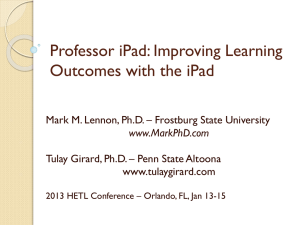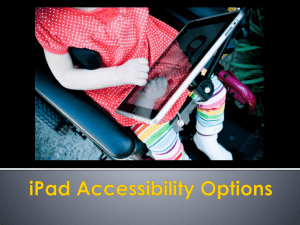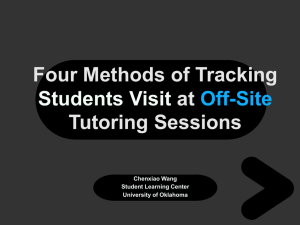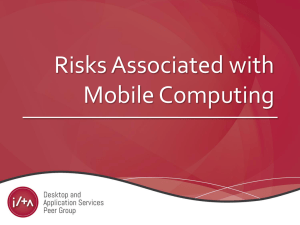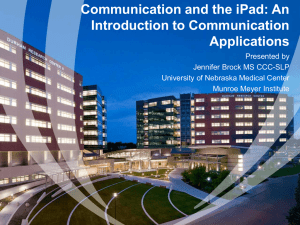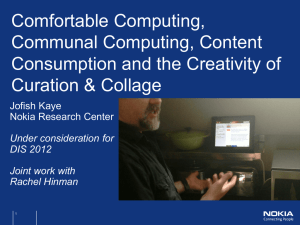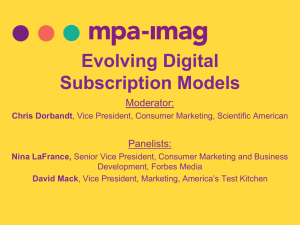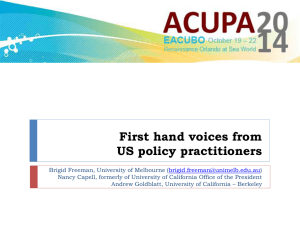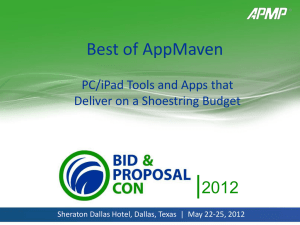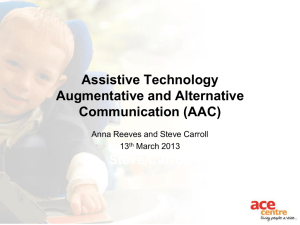The Impact of Tablet Computers on Students
advertisement
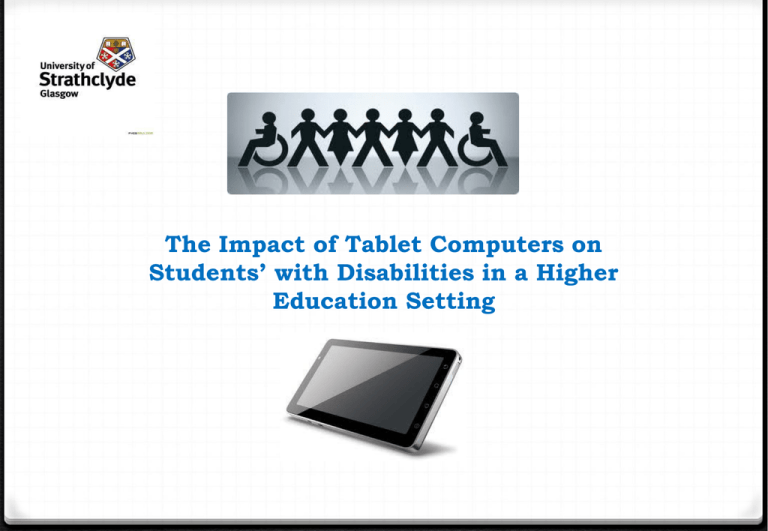
The Impact of Tablet Computers on Students’ with Disabilities in a Higher Education Setting Study Introduction 0 Motivation – collaborative pilot study, iPads, practical research for the disability service. 0 The key themes of the study include: functionality, academic support, and access to university services. Research Objectives 0 To investigate the way tablet computers impact upon disabled students’ educational experience. Functionality: How the students interacted with the physicality and functionality of the tablet computer. Academic Support: How the students used the table computer for reading, writing and communication in a variety of situations. Access to University Services: How the tablet computers affects the students’ usage of library and VLE resources. Research Methodologies 0 Research Paradigm – Interpretivist Research 0 A mixed methods approach, employing both qualitative and quantitative research methods. 0 Online survey, task exercises and finally interviews 0 All 3 research methods gave the study research triangulation Study Sample and Provision 0 974 disabled students at Strathclyde University contacted. 0 A total of 194 students responded to the invitation. 0 A quota sampling method was adopted – 2 students for each 0 0 0 0 0 0 (modified) UCAS disability category 12 participants for the study Participants were from a mix of disciplines and both undergraduates and postgraduates participated Training participants – orientation session with students Participants were given an iPad for 3 weeks Guidance was given on best practice regarding privacy and confidentiality Tablets were cleaned – removal of any information that had been stored purposefully or inadvertently by a previous user Online Survey The surveys were piloted at the Disability Service. Survey Investigated: 0 0 0 0 0 0 0 0 Time spent using the iPad General purpose of usage Use for academic-specific activities Who the students used the iPad to communicate with Which methods of communication the students used Applications used during the loan period Any additional downloads of applications Any problems or benefits experienced when using the iPad Task Exercises 0 Compare a tablet computer to a laptop for carrying out simple information searches on university web pages 0 The research was concerned with comparing environments, not testing students' ability 0 Tasks were randomised to avoid learning effects 0 Tasks could not therefore be identical but needed to be similar Interviews 0 Interviews were semi-structured and each researcher used the same interview schedule 0 Interview Themes: - Student engagement with the physical characteristics and functionality of the iPad - Using the iPad in academic life - Communication with peers and university staff - Using the iPad to access university services Survey Results: Activities Activities 10 9 Participants 8 7 6 5 4 3 2 1 0 Internet browsing University Social Watching website networking video Myplace / Spider Other University Listening to library music website Gaming I did not use the iPad Survey Results: Academic Usage Academic usage 10 9 Participants 8 7 6 5 4 3 2 1 0 Reading course material Accessing library Accessing Note taking at a Virtual Learning lecture / tutorial Enviroment (Myplace) Word processing Recording a lecture / tutorial Nothing Other Survey Results: Communication Forms of communication 10 9 Participants 8 7 6 5 4 3 2 1 0 Email Social network / Instant messaging twitter Forum posting Skype Other Nothing Survey Results: Communication Who did you communicate with? 10 9 Participants 8 7 6 5 4 3 2 1 0 Tutors or lecturers Students on your course Other members of university staff (eg. IT or Admin staff) Students on other courses None of the above Other Survey Results: Apps Which apps did you use? 10 9 Participants 8 7 6 5 4 3 2 1 0 Notes Pages Maps PDF Reader Calendar Speak it! iBooks Chambers Dragon MindNode AudioNote Reminders Dictionary Dictation Interview Results – Functionality: Pros and Cons 0 Respondent C: “ ... it’s just the fact that it’s like all on one screen and you can scroll along to the apps where as you know you have to sort of search online for something…” 0 Respondent F: “No. The fact it doesn’t have a USB drive … I think it’s so stupid though without one.” Interview Results – Functionality: Pros and Cons 0 Respondent E: “You want to use it because the size of it because of the weight of it … it can fit in your bag quite easily and there is no kind of restrictions you don’t ever feel like … huh ... this is a pain.” 0 Respondent A: “I found the iPad heavy to hold and because of my physical disability I had to lean it on my forearm to support it. Using it on the desk was just too difficult, you get a sore back and neck … but holding it in one hand and using the another as it is suppose to be held was just not possible for me.” Academic Support – Reading: Pros and Cons 0 Respondent B: “More flexibility, I can read whenever I want, I’ve got these funny glasses with thick glass on one side and I feel self-conscious using them on the train, since having the iPad I feel better on the train and don’t care if people are looking, its handy in that way.” 0 Respondent E: “…because I am visually impaired.. to see it tipped back, it has to be quiet close.. I have to kind of lean over it” Academic Support – Writing: Pros and Cons 0 Respondent I: “I wouldn’t write my dissertation on it, I found it good for taking notes and looking at notes you already had.” 0 Respondent J: “I didn’t do any real writing, I think I will still go back to a laptop, I don’t think you can word process for any time without a keyboard...” Academic Support – Communication: Pros and Cons 0 Respondent A: “I was definitely communicating more, the same way ... emailing ... but much more with the iPad.” 0 Respondent F: “No the iPad did not change my method of communication. I did send emails … a few emails to a few people …” 0 Respondent A: “Yes, I have a Facebook profile but I never really used it before but then with the iPad I was using it all the time.” Access to University Services: Pros and Cons 0 Respondent D: “I used MyPlace to access lectures notes in the lectures, I downloaded PDFs from MyPlace and flicked through it there...” 0 Respondent G:“I used MyPlace more in the last 3 weeks than ever before at uni.” 0 Respondent H: “It is difficult navigating round MyPlace on the iPad” Summary of Findings 0 Portability - the weight and size of the iPad when carrying it around the university 0 Fast boot time, especially for writing emails 0 Good for note taking & audio recording lectures 0 Zoom function a positive for all users, especially VI users 0 Intuitive – user friendly and therefore easy to learn how to use 0 Good Apps – Speak it! and Notes 0 Allows good use of time for academic related tasks on campus and on the move Summary of Findings 0 Useful for reading journal articles, online browsing, and using online library and learning resources 0 Increased usage of facebook and emailing as a means of building social and academic networks 0 Students accessed the university VLE’s more and utilised these sites to organise and communicate with their social and academic networks 0 The weight of the iPad when holding it and the difficulty of finding an appropriate place to use it 0 Lack of specialist software or apps Summary of Findings 0 Difficulties using university WiFi 0 Problems navigating VLE (Myplace website) when text is enlarged for VI students 0 Difficult to write longer pieces of work like dissertations 0 Lack of certain features, especially USB port and a physical keyboard 0 Some functions provided by smartphones which student may already have 0 No Microsoft packages available 0 Instant access to sites such as facebook could be a distraction! Limitations & Future Research Limitations: 0 0 0 0 0 Small number of participants Short lending period of tablet computers Students taking part during busy term time No control group Limited resources Future Research: 0 Longer time period with more participants 0 Focus on 1 or 2 disability categories: VIP or Hearing Impaired 0 Variety of tablet computers
